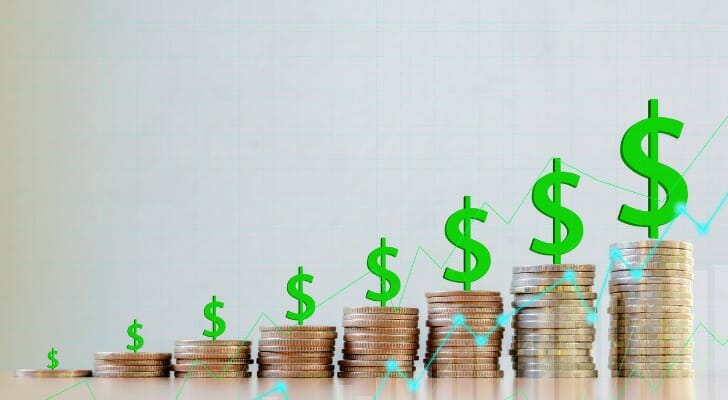
Bonds and certificates of deposit (CD) are generally safe investments with little to no risk of reducing your principal. However, each one has distinctive features that may suit different kinds of investors. The bonds vs. CDs choice takes some consideration depending on your risk tolerance and liquidity needs.
A financial advisor can offer valuable insight and guidance as you consider your investment options.
Bonds vs. CDs: An Overview
If you’re looking to invest money with little risk, you may be considering bonds and CDs. A bond is basically a loan you provide to a company or government. In exchange, the borrower agrees to pay you back along with a certain amount of interest at a specific point in time. That range can stretch several years, so bonds can be long-term investments. On the other hand, you can open a CD at some banks for as short as one month. Unlike with bonds however, you’re not lending money to anyone. You’re simply depositing a certain amount of cash at a bank. In exchange, the bank will return your investment along with interest after the CD term ends. Should you want to access that money earlier, you will have to pay an early withdrawal penalty.
What Are Bonds and How Do They Work?
A bond pays interest based on a coupon rate. The coupon rate is the earnings you’ll receive, expressed as a percentage of the principal that you pay to buy the bond.
This figure tends to reflect the interest rate range set by the Federal Reserve. This is what most people refer to when they speak about the interest rate environment. Often called the federal funds rate, this metric has a major impact on figures like the interest rate on your mortgage or savings account. The same goes for bonds. In fact, many types of bonds are priced relative to a specific Treasury bond.
While these rates tend to be low compared to the return you’d get stocks in a bull market, the main appeal of bonds is that you’re almost guaranteed to not lose your investment. Unless the company you bought the bond for goes bankrupt or the government you invested in collapses, you’re getting your money back with interest as agreed upon. And even if the company goes bankrupt, it must pay back its bond holders before it pays its stock holders.
Most types of bonds pay interest up until maturity at agreed-upon intervals. Of course, there are several types of bonds including corporate bonds and municipal bonds. More on that later. For now, let’s focus on that utmost important factor of interest.
How Do Bonds Work With Interest Rates?
Across the board, interest rates and bond prices share an inverse relationship. This means that when interest rates fall, bond prices tend to rise. Why? Consider this. You’re holding onto a bond at a point when interest rates suddenly skyrocket. This means new bonds issued would reflect those rates. So if you wanted to sell your bond with the lower interest rate, you’d have to lower the price in order to convince other investors to buy it. However, this situation remains a concern only if you sell your bonds before maturity.
Another point to consider, however, is the rate of inflation. This describes the general price of consumer goods at any given time based on the Consumer Price Index (CPI). If inflation goes haywire, the price of goods go up. This means the value of your dollar takes a nosedive.
And if inflation climbs higher than the interest you’re earning on your bond, you’re actually losing money in the long run, because the cash you’re getting back can actually buy less. Thus, you should also base what you’re willing to pay for a bond on how much you expect inflation to dissolve your earnings.
Bond Risks
Bonds generally stand as “safe investments.” But this doesn’t mean bonds don’t come with risks. We’ve discussed inflation risk and interest-rate risk. Now, let’s look at other bond investing factors.
For starters, you must consider credit risk. Some credit agencies rate companies and governments based on the likelihood they will default or fail to pay you back. Think of it as a kind of credit score. The higher it is, the more likely they are to meet their debt obligations.
In the bond market, the highest rating an issuer can earn is an AAA rating. But you’ll also come across terms like “junk bonds.” As the name implies, these are high-yield bonds issued by borrowers deemed likely to default. Some examples include bonds that failing companies or countries issue.
When you invest in a U.S. government bond, it’s backed by the “full faith of the United States government.” And no matter how much trouble you think it’s in, the American government is not likely to collapse. As you know, that’s not the case with all governments. All in all, tread lightly when investing in foreign government bonds.
Types of Bonds
The bond world may be larger than you think. It encompasses more than just your typical Uncle Sam-issued bond. Below, we cover some of the most common types of bonds:
Treasury Bonds: The U.S. federal government issues these bonds to fund its own debt obligations. Many experts consider these investments among the safest in the world and virtually risk-free. They’re backed by the full faith and credit of the U.S. government and, of course, its overwhelming authority to levy taxes. However, these types of bonds such as T-Bills often generate low yields. But state and local governments exempt interest from taxation.
Municipal Bonds: State and local governments issue these bonds to fund public works projects and other initiatives. More importantly, the interest earned by most municipal bonds is exempt from federal taxes. And in some cases, the state issuing the bond will waive interest taxes if you live in it. This arrangement makes municipal bonds or “munis” particularly attractive to people in high tax brackets.
Corporate Bonds: Companies and other commercial entities issue these bonds to fund their business practices. They usually carry high yields. And investment-grade corporate bonds carry low credit risk. However, they face a large tax burden. So, consider how your tax situation may impact you when investing in corporate bonds. A CFP or CPA can help with this.
Foreign Bonds: Foreign governments and companies issue these bonds. Oftentimes, these entities agree to pay your principal back in foreign currency. Thus, exchange rates here are stronger factors in how big or small your return would be. Of course, not all governments have the resources of the United States. So they may even default on your loan.
Zero-Coupon Bonds: These types of bonds don’t pay interest regularly. Instead, interest accrues semiannually. Then, the borrower pays you interest along with your principal at the point of maturity.
Bond Funds: You can also put your money in mutual funds which invest in a basket of different bonds with an aim for diversification and preservation of capital. Some bond exchange-traded funds (ETF) usually carry low fees because of their passive management. This means these funds aim to mirror a specific index of securities rather than outperform the market.
Who Should Invest in Bonds?
If you’re looking to diversify your investment portfolio, you should definitely consider bonds. Based on your risk tolerance, you can benefit from investing in a mix of bonds and stocks to aim for growth, while also protecting your assets.
Bonds can also serve as crucial components to 401(k) plans or individual retirement accounts (IRA). If you’re nearing retirement, bond investments can also serve as wedges against market volatility in order to protect your nest egg when you need it the most. But if you’re far from retirement, you may want to widen your exposure to more growth-oriented investments like stocks and stock funds. In this case, you have time to stomach the ups and downs of the stock market.
Nonetheless, bonds can serve as key components to any diversified and well-balanced portfolio. The amount you should devote to bonds, however, depends on your risk tolerance. You can use our asset allocation calculator to visualize what a decent mix of stocks and bonds may look like based on your risk tolerance.
Of course, the types of bond you invest in also will depend heavily on your goals and tax situation. If you’re not sure which type of bond investments are best for you, you may want to find a certified financial planner (CFP).
Where Can I Buy Bonds?
You can buy government bonds directly from the U.S. Treasury online at TreasuryDirect. Brokerage firms can give you access to other types like corporate and municipal bonds. However, brokerage firms typically charge transaction fees that can vary widely from one brokerage to the next. In addition, some may require minimum investments. So be sure to shop around.
What Is a Certificate of Deposit (CD) And How Does it Work?

A certificate of deposit (CD) is a type of savings vehicle issued by a bank or credit union. These tend to generate higher interest rates than savings accounts or even the best money market accounts. And like bonds, CDs have a point of maturity, which indicates when you’ll get the money you invested back. You park your money in a CD for a specific amount of time and have your money earn interest there.
The span to maturity can stretch anywhere from one week to 10 years at some banks. At maturity, most banks give you a 10-day grace period when you can withdraw your money. Otherwise, it may automatically renew under the same term and with the interest rate offered at that time.
Financial institutions often offer the best rates for CDs with longer terms. But not all are created equal. So explore the best CD rates offered by banks across the country.
In addition, banks also decide how they compound the interest on your CD. They can choose to do so daily, weekly, annually or at some other interval. The decision can have a major impact on what your return looks like. So make sure you know these details before you decide to work with a particular bank.
But in general, CDs are considered among the safest investments around. At several banks, your money will be FDIC-insured up to the $250,000 maximum. This means that even if the bank goes down under, your money stays safe. The NCUA provides similar coverage to CDs at member credit unions.
But as with any investment, this doesn’t mean they’re 100% risk free.
CD Risks
When you open a CD, you must keep your money invested until the date of maturity or face a hefty early-withdrawal penalty. Individual banks determine the extent of these penalties, but they’re seldom light. In fact, it can take a serious chunk off your interest and may even eat into your principal. So make sure you open one for a term you can stomach.
And as with bonds, the interest rate environment heavily determines your potential for return. During periods of low interest rates, you can bet banks won’t be too generous with their CD offerings. Or you can lock your money in for a good deal when the Fed hikes rates.
Still, you must also consider inflation risk. If you invest in a 10-year CD, for example, the large return may not be worth much when you finally get it. One way to work around this is to establish a CD ladder.
This works by opening several CDs with different terms. Each date of maturity serves as a different rung on the ladder and another pay-off period. This ensures you pull a steady stream of income along with some interest.
And if you’re looking to park very large sums, you may want to open CDs at different banks. Remember, the FDIC insures up to $250,000 per depositor, per institution.
But just as you can invest in CDs for different terms, you can invest in different types of CDs all together.
Who Should Invest in CDs?
CDs generally benefit the most risk-averse. But as with any low-risk investment, you can’t expect to get rich off of it. You’re likely to receive your money back in addition to interest especially if you’re deposit is FDIC insured. But it likely won’t be a major return even in a high interest rate environment.
Nonetheless, CDs can serve as great investments if you’re saving for a short-term goal such as a vacation down the road or if you want build up money for a down payment on a mortgage. And if investing in a CD sounds right for you, there are few options you can choose from.
Types of CDs
Fixed-interest Rate CDs: As its name implies, these CDs generate a set interest rate when you open the account.
Variable-Interest Rate CDs: These types of CDs may suit the more risky investor. Your interest rate can rise or dip throughout your term depending on the current interest rate environment.
Jumbo CDs: These CDs usually earn higher yields than their standard counterparts but require a much larger minimum investment. Some banks take a minimum as high as $25,000.
IRA CDs: These CDs come with all the bells and whistles of an IRA. This means your investment grows tax-free until you make qualified withdrawals at retirement when you may be in a lower tax bracket. However, the interest rates on these options reflect their standard counterparts, so they’re usually low. Therefore, they may not be the best bet for people who still have a long way to retirement and the risk appetite to invest in more growth-focused investments like stocks.
Where Can I Open a CD?
You can usually walk into any bank or credit union and open a CD account. But make sure you ask about the different terms, interest rates and early-withdrawal penalties. Some banks offer occasional promotional rates that allow you to lock in your money for better terms if you reach out at the right time. Furthermore, you should ask about how the bank compounds interest. All things equal, you’d get a bigger return from one that compounds on a daily basis as opposed to a monthly basis.
In addition, you can open most CDs through online banking. So shop around.
The Bottom Line

In a rising interest rate environment, you’ll likely find CDs with generous rates. And these days, it has never been easier to surf the web to find the best CD rates. On the other hand, the price of bonds and interest rates share an inverse relationship. Bond prices usually dip as interest rates fall. So unless you hold onto your bonds until maturity, you may have to sell them at lower prices to steer investors from putting their money in newly-issued bonds with higher rates.
If you’re risk-averse and need savings for the short term, CDs may be the best bet especially in a high interest rate climate. If you’re looking to diversify your portfolio or beginning your retirement planning for the long-term, it may behoove you to devote a steady portion of it to bonds. And, of course, there’s no rule saying you can’t invest in both.
Tips for Investing in Bonds and CDs
- Consider working with a financial advisor as you evaulate relevant factors, such as your financial goals, interest rates and the vast number of options before you. Finding a financial advisor doesn’t have to be hard. SmartAsset’s free tool matches you with up to three vetted financial advisors who serve your area, and you can interview your advisor matches at no cost to decide which one is right for you. If you’re ready to find an advisor who can help you achieve your financial goals, get started now.
- Banks around the country compete to offer the best CDs. To help you narrow your choices, we published a study on the best banks in the U.S.
Photo credit: ©iStock.com/honglouwawa, ©iStock.com/Foryou13, ©iStock.com/ventdusud